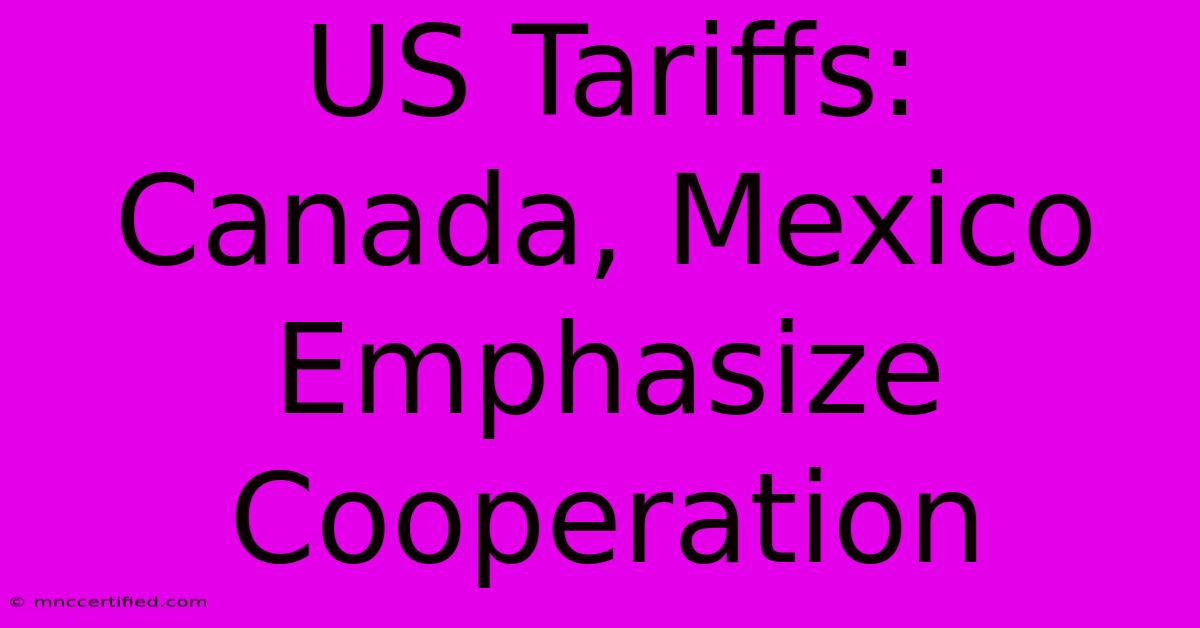US Tariffs: Canada, Mexico Emphasize Cooperation

Table of Contents
US Tariffs: Canada, Mexico Emphasize Cooperation Amidst Trade Tensions
The ongoing impact of US tariffs on goods from Canada and Mexico continues to shape North American trade relations. While periods of tension persist, a crucial theme emerges: cooperation. This article delves into the intricacies of the situation, exploring the strategies employed by Canada and Mexico to navigate the challenges posed by US tariffs and highlighting the importance of collaborative efforts to maintain a strong and stable trading bloc.
Understanding the Impact of US Tariffs
US tariffs, implemented under various administrations and citing reasons ranging from national security to trade imbalances, have significantly impacted the economies of Canada and Mexico. These tariffs affect key sectors, including:
- Agriculture: Tariffs on agricultural products like dairy and softwood lumber have caused significant disruptions to Canadian farmers and producers.
- Automotive: The automotive sector, a cornerstone of the North American economy, has faced substantial challenges due to tariffs on auto parts and finished vehicles. This particularly impacts the integrated supply chains shared by the three nations.
- Steel and Aluminum: Tariffs on steel and aluminum have impacted manufacturing industries in both Canada and Mexico, leading to job losses and increased production costs.
These tariffs not only directly affect businesses but also ripple through the broader economy, impacting consumers through higher prices and reduced choices.
Navigating the Challenges: Canadian Strategies
Canada's response to US tariffs has been multifaceted, focusing on:
- Negotiation and Diplomacy: Canada has consistently engaged in high-level diplomatic discussions with the US administration, aiming to find mutually acceptable solutions and resolve trade disputes through dialogue.
- Trade Diversification: Recognizing the risks of over-reliance on the US market, Canada has actively pursued trade agreements with other countries to diversify its export markets and reduce its vulnerability to US trade policies. This includes strengthening ties with Asian and European nations.
- Domestic Support Measures: The Canadian government has implemented support programs for affected industries and workers, providing financial assistance and helping them adapt to changing market conditions.
Mexican Approaches to Tariff Mitigation
Mexico, similarly, has adopted a strategic approach to mitigate the negative effects of US tariffs. Key strategies include:
- Strengthening Regional Integration: Mexico has emphasized the importance of strengthening its trade relationships with other North American partners through initiatives like the USMCA (United States-Mexico-Canada Agreement). This aims to create a more resilient and integrated regional economy.
- Investment in Domestic Industries: Mexico has focused on fostering growth in domestic industries to reduce dependence on US markets and enhance its capacity for self-sufficiency.
- Focus on Value-Added Products: Shifting towards the production and export of value-added goods can help reduce sensitivity to tariffs and improve the competitiveness of Mexican exports.
The Power of Cooperation: A Path Forward
Despite the challenges, the overriding message from both Canada and Mexico is one of continued cooperation with the United States. Maintaining a strong and predictable trading relationship with the US remains a top priority. The emphasis on collaboration stems from several key factors:
- Intertwined Economies: The economies of Canada, Mexico, and the US are deeply intertwined, making it crucial to maintain stable and mutually beneficial trade relations.
- Shared Supply Chains: The intricate web of supply chains connecting the three countries necessitates a collaborative approach to addressing trade challenges and ensuring smooth cross-border flows of goods and services.
- Regional Stability: A strong and stable North American trading bloc contributes to regional economic growth and stability, benefiting all three countries.
Keyword Optimization: A Note for SEO
This article incorporates several key search terms naturally, including: "US tariffs," "Canada tariffs," "Mexico tariffs," "USMCA," "North American trade," "trade relations," "trade agreements," "economic cooperation," and "trade disputes." Remember to use relevant long-tail keywords in your meta descriptions and title tags for better search engine optimization. Further, link building to relevant authoritative sites discussing the USMCA and related trade policies can bolster your article's search ranking.
In conclusion, while the impact of US tariffs on Canada and Mexico remains significant, the prevailing strategy is one of calculated cooperation. Through diplomacy, economic diversification, and a commitment to regional integration, Canada and Mexico are working to navigate the complexities of the current trade environment and maintain a strong, stable relationship with their largest trading partner. This collaborative approach is vital not only for the economic well-being of the three nations but also for the overall stability of the North American trading bloc.

Thank you for visiting our website wich cover about US Tariffs: Canada, Mexico Emphasize Cooperation. We hope the information provided has been useful to you. Feel free to contact us if you have any questions or need further assistance. See you next time and dont miss to bookmark.
Featured Posts
-
Randolph Insurance Randolph Ma
Nov 27, 2024
-
Viewers Divided Over Bonnie Blues Comment
Nov 27, 2024
-
Request For Proposal Insurance
Nov 27, 2024
-
Food Shortages Hit Supermarkets After Cyberattack
Nov 27, 2024
-
Loya Insurance Company Careers
Nov 27, 2024